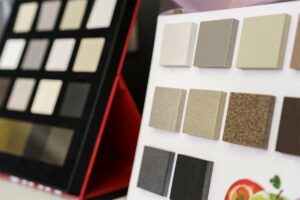Granite countertops are a popular choice for many homeowners due to their durability, versatility, and aesthetic appeal. However, these high-quality countertops require proper care and maintenance to ensure they remain in excellent condition for years to come. In this article, we will explore best practices for cleaning, sealing, and maintaining granite countertops, as well as address issues such as discoloration and staining.
Introduction
Granite countertops are a significant investment for any homeowner, and proper maintenance is essential to ensure they retain their value and beauty over time. By following best practices for cleaning, sealing, and maintaining granite countertops, you can extend their lifespan and protect your investment.
Benefits of Granite Countertops
Granite countertops offer many benefits, including:
- Durability: Granite is a hard, durable material that can withstand daily wear and tear, making it an excellent choice for high-traffic areas.
- Versatility: Granite is available in a variety of colors and patterns, making it a versatile option for any kitchen or bathroom design.
- Heat resistance: Granite is heat-resistant, so you can place hot pans and dishes directly on the surface without damaging it.
- Hygienic: Granite is a non-porous material, making it resistant to bacteria and easy to clean.
Common Causes of Damage to Granite Countertops
While granite is a durable material, it is not indestructible. Here are some common causes of damage to granite countertops:
- Scratches: Granite is a hard material, but it can still be scratched by sharp objects, such as knives or abrasive cleaning tools.
- Stains: Granite is a porous material, and if it is not properly sealed, it can absorb liquids, resulting in stains and discoloration.
- Chips and cracks: Granite can be chipped or cracked if it is subjected to heavy impact or pressure.
- Heat damage: While granite is heat-resistant, extreme temperature changes, such as placing a hot pan on a cold surface, can cause cracks in the granite.
How to Clean Your Granite Countertops
Proper cleaning is essential to maintaining the beauty and durability of your granite countertops. Follow these steps to clean your granite countertops:
- Wipe down the surface with a soft cloth or sponge and warm water.
- Avoid using abrasive cleaners or scrubbing pads, which can scratch the surface of the granite.
- Use a gentle cleaning solution specifically designed for granite countertops.
- Dry the surface with a soft cloth to prevent water spots.
Best Practices for Sealing Granite Countertops
Sealing your granite countertops is an important step in protecting them from stains and discoloration. Follow these best practices for sealing granite countertops:
- Use a high-quality granite sealer.
- Apply the sealer according to the manufacturer’s instructions.
- Allow the sealer to dry completely before using your countertops.
- Reapply the sealer as needed, typically every 1-3 years.
Preventing Damage to Granite Countertops
Prevention is key to extending the lifespan of your granite countertops. Here are some tips for preventing damage:
- Use cutting boards and trivets to protect the surface from scratches and heat
- Avoid placing heavy objects on the countertop.
- Wipe up spills immediately to prevent stains from setting in.
- Avoid using harsh cleaning products that can damage the surface of the granite.
Addressing Stains and Discoloration on Granite Countertops
Despite your best efforts, your granite countertops may still become stained or discolored. Here are some tips for addressing stains and discoloration:
- Use a poultice made from a mixture of baking soda and water to remove stubborn stains.
- Apply the poultice to the stain and cover it with plastic wrap.
- Allow the poultice to sit overnight, then rinse it off with warm water.
- For more stubborn stains, consider using a granite cleaner specifically designed for removing stains.
How to Repair Chips and Cracks in Granite Countertops
If your granite countertop becomes chipped or cracked, it’s important to address the issue promptly to prevent further damage. Here’s how to repair chips and cracks in granite countertops:
- Clean the damaged area with warm water and a mild detergent.
- Dry the area completely with a soft cloth.
- Apply a granite epoxy to the damaged area, using a toothpick or other small tool to spread it evenly.
- Allow the epoxy to dry completely, then use a fine-grit sandpaper to smooth the surface.
When to Replace Your Granite Countertops
With proper care and maintenance, granite countertops can last for decades. However, there may come a time when you need to replace your countertops. Here are some signs that it’s time to replace your granite countertops:
- Cracks or chips that cannot be repaired
- Severe staining or discoloration that cannot be removed
- Significant damage from heat or impact
- Outdated or damaged design that no longer fits your style or needs
Conclusion
Proper care and maintenance are essential to extending the life of your granite countertops. By following the best practices outlined in this article, you can protect your investment and enjoy beautiful, functional countertops for years to come.
FAQs
- Can I use vinegar to clean my granite countertops?
- No, vinegar is an acidic substance that can etch the surface of your granite countertops, causing damage over time.
- How often should I seal my granite countertops?
- Granite countertops should be sealed every 1-3 years, depending on the manufacturer’s recommendations and the amount of use they receive.
- Can I use bleach to remove stains from my granite countertops?
- No, bleach can cause discoloration and damage to your granite countertops. Use a poultice or granite cleaner specifically designed for removing stains instead.
- Can I place hot pans and dishes directly on my granite countertops?
- Yes, granite is heat-resistant and can withstand high temperatures. However, it’s still a good idea to use trivets or hot pads to protect your countertops and prevent scratches.
- How can I prevent scratches on my granite countertops?
- Use cutting boards and avoid using abrasive cleaning tools or materials that can scratch the surface of your granite countertops.





